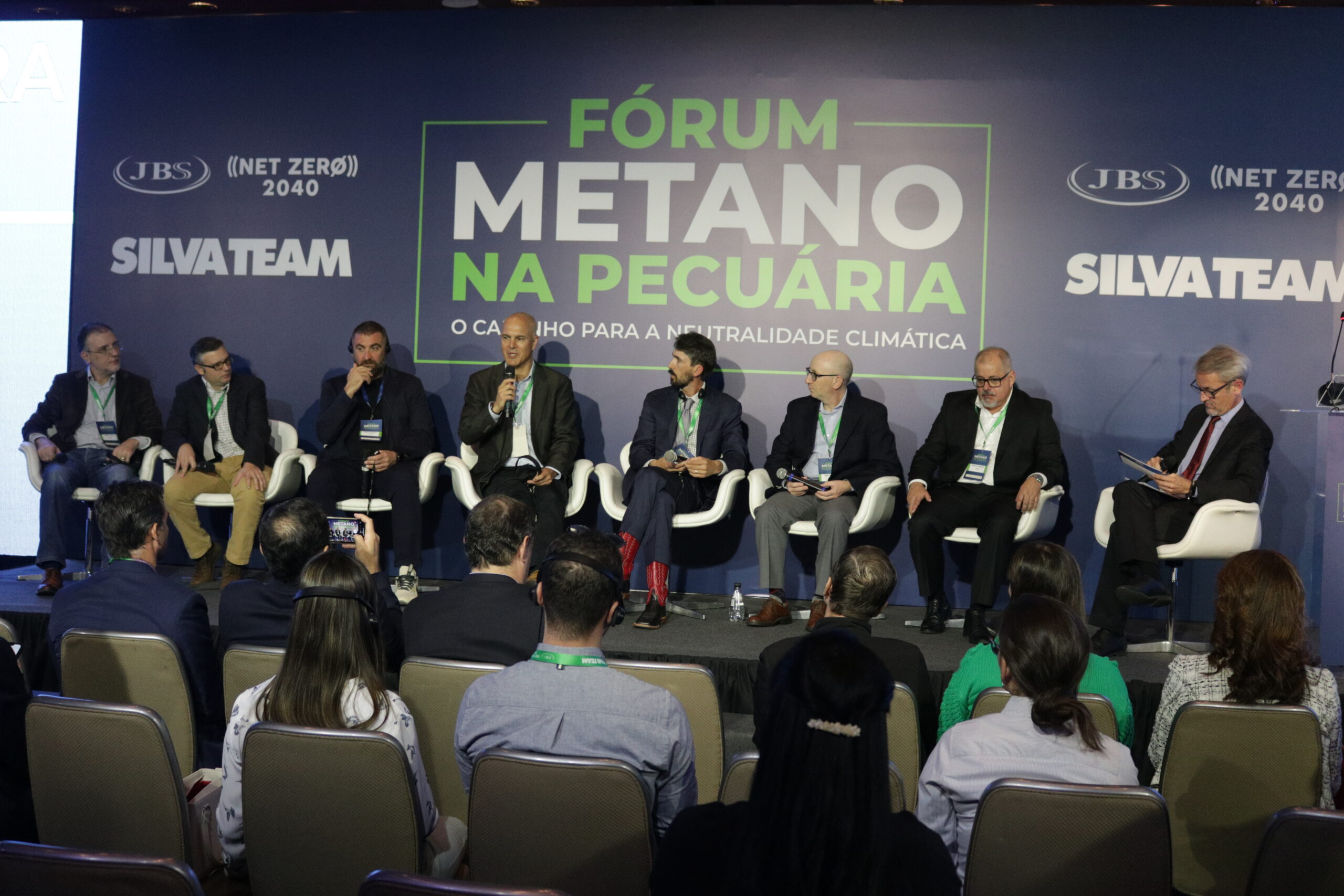The informative and instructional lectures marked the second day of the Livestock Methane Forum, promoted by JBS and Silvateam. The two-day event ended on Thursday (5) at the Hilton Sao Paulo Morumbi, south of Sao Paulo.
In the afternoon, a working example of a farm with a positive balance in livestock management and agriculture was revealed, the actions of JBS and Silvateam in an effort to reduce emissions and an overview of the carbon credits market.
Juan Tricarico, Vice President of Sustainability Research at Dairy Management Inc, USA, discussed how food, genetics, and waste management contribute to reducing emissions. “Some additives directly interfere with the rumen, others alter the fermentation process. Therefore, it is necessary to ensure an appropriate dose of these products for animals so as not to endanger their health.”
Darren Henry, a professor at the University of Georgia, USA, cited studies involving tannins and other additives in livestock feed, including one sponsored by JBS, concluding that the results are similar and that the potential for reducing methane is significant.
Roberto Giulo, a researcher at Embrapa Gado de Corte, showed the weight of emissions from bovine cows – 85% of all intestinal emissions, which in turn accounts for 65% of emissions from agriculture.
Currently, the largest share (46%) of Brazilian emissions from carbon dioxide equivalent (CO2 eq) – the measure to which all gases are converted – come from land use and change, not from agriculture and livestock (28%), in isolation . . Deforestation is the biggest problem. “It hinders Brazil, agribusiness and livestock, more intensively. We don’t need to deforestation. We have technologies, such as integrated systems, that improve production and productivity. Soil carbon is synonymous with efficiency,” he defined. The integrated systems the researcher referred to are the Crop-Livestock Integration (ILP) and the Crop-Livestock-Forest (ILPF) Integration.
Eduardo Marostigan de Paula, a researcher at the Institute of Animal Science, affiliated with the State Agribusiness Technology Agency (APTA), has demonstrated laboratory studies conducted by the entity and other international organizations to demonstrate the effect of methane on food efficiency, from diets consisting of essential oils extracted from plants such as Thyme, cinnamon, and others contain tannin – a substance that has been shown to prevent the release of methane in the beef rumen.
“Despite the huge potential, we still have a good path to getting correct doses and more accurate in terms of results,” he said. APTA is part of a partnership with JBS and Silvateam to assess livestock emissions from the supply of products developed by Silvateam, through The Silvafeed Corporation.
It was the responsibility of Marcelo Manila, the company’s director, to present the results of 15 years of studies at Silvateam. Among the conclusions obtained in 39 studies published in different parts of the world, in addition to reducing methane emissions by up to 30%, EO were scored in the increase in cow weight (7.5%), feed conversion and carcass weight (6.4 kg).
Fabio Dias, Director of Relationships with Plantation Owners in Friboy, also emphasized the importance of combating deforestation in Brazil, given the importance of the issue over emissions. For this reason, the company is advancing in monitoring the entire livestock supply chain. The role of the transparent livestock platform is emphasized. With that, our suppliers become ‘guards’, i.e.they can Monitoring situations in which there is deforestation in the areas of its suppliers, over which we do not directly control. If our suppliers start to follow suit, we will take a very important step in the process.”
He also highlighted the work of the 15 green offices implemented by the company, which support environmental actions by producers and were responsible for regulating 2,642 properties. From May 2021 to February 2022, this property provided more than 600,000 heads for slaughter at Freeboy.
Regarding methane, he reported that next May, he will start slaughtering animals supplemented with additives that reduce livestock emissions. I am sure the results will be promising. We at JBS are very interested in studying rumen efficiency, where positive results will have an impact on the company,” he concluded, referring to the company’s Net Zero goal in 2040.
Also participating on the second and final day of the event were speakers Mauricio Palma Nogueira, of livestock consultancy Athinagro. Federico Brugnoli, Spin360 Director (Italy); Pilerson Benido from the Roncador Collection. Luis Fernando Tamasia of DSM; Henrique Pereira of WayCarbon Consulting, Andrea Formigoni of the University of Bologna (Italy) and Michael Bocaduro of West Coast Advisors (USA).

“Wannabe internet buff. Future teen idol. Hardcore zombie guru. Gamer. Avid creator. Entrepreneur. Bacon ninja.”

